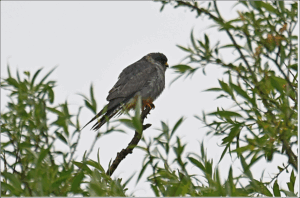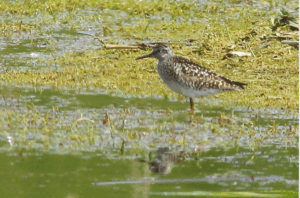Rare birds recorded in record numbers at Forterra’s Kings Dyke Nature Reserve

One of two red-footed falcons present on the reserve on 20/5/2025 – Copyright George Walthew
Forterra marked World Nature Conservation Day with uplifting biodiversity news from its Kings Dyke Nature Reserve in Whittlesey, Cambridgeshire. The reserve, a former clay extraction site now transformed into a thriving wetland habitat, has seen an unprecedented influx of bird species in 2025
A total of four new species have been recorded by the site’s dedicated volunteers, which is double the usual yearly average and a record for the site.
Among the new arrivals are two red-footed falcons, spotted as part of a wider national influx into the UK, and a Savi’s warbler, an elusive summer visitor rarely encountered in Britain. A wood sandpiper, a fairly scarce wader, was also recorded in April. Most recently, a purple heron was seen in the reedbeds; once a rarity in the UK, this bird is now slowly becoming more established.
These additions bring the site’s identified species of birds total to an impressive 170, reflecting the exceptional quality of habitat management at Kings Dyke and the long-standing commitment of local conservationists.

Wood sandpiper present at the reserve on 29/04/2025 (heavily cropped image) – Copyright Terry McKenna
Phil Parker, Forterra’s ecological advisor, said: “This year’s sightings are a powerful reminder of what carefully managed post-industrial land can offer in terms of biodiversity. The reedbeds, open water, and scrub mosaics at Kings Dyke are attracting rare birds and sustaining them. The success of the site reflects decades of community effort and a broader industry shift towards ecological restoration.”
Kings Dyke has long been recognised for its biodiversity value. In 2018, the site hosted a 24-hour BioBlitz led by BBC Springwatch’s Chris Packham, recording over 1,100 species in a single day, far more than any other site surveyed that year. Annual BioBlitz events continue to track species diversity across birds, invertebrates, and flora.
Forterra’s environmental work extends well beyond Kings Dyke. Across its sites, the company is investing in habitat restoration, circular economy innovation, and low-carbon technologies. Recent initiatives include solar energy integration at Retford and Desford, calcined clay development from recycled brick waste, and Hydrogen trials at its Measham plant in Leicestershire.
To find out more about Forterra’s sustainability strategy, visit: www.forterra.co.uk/sustainability.
